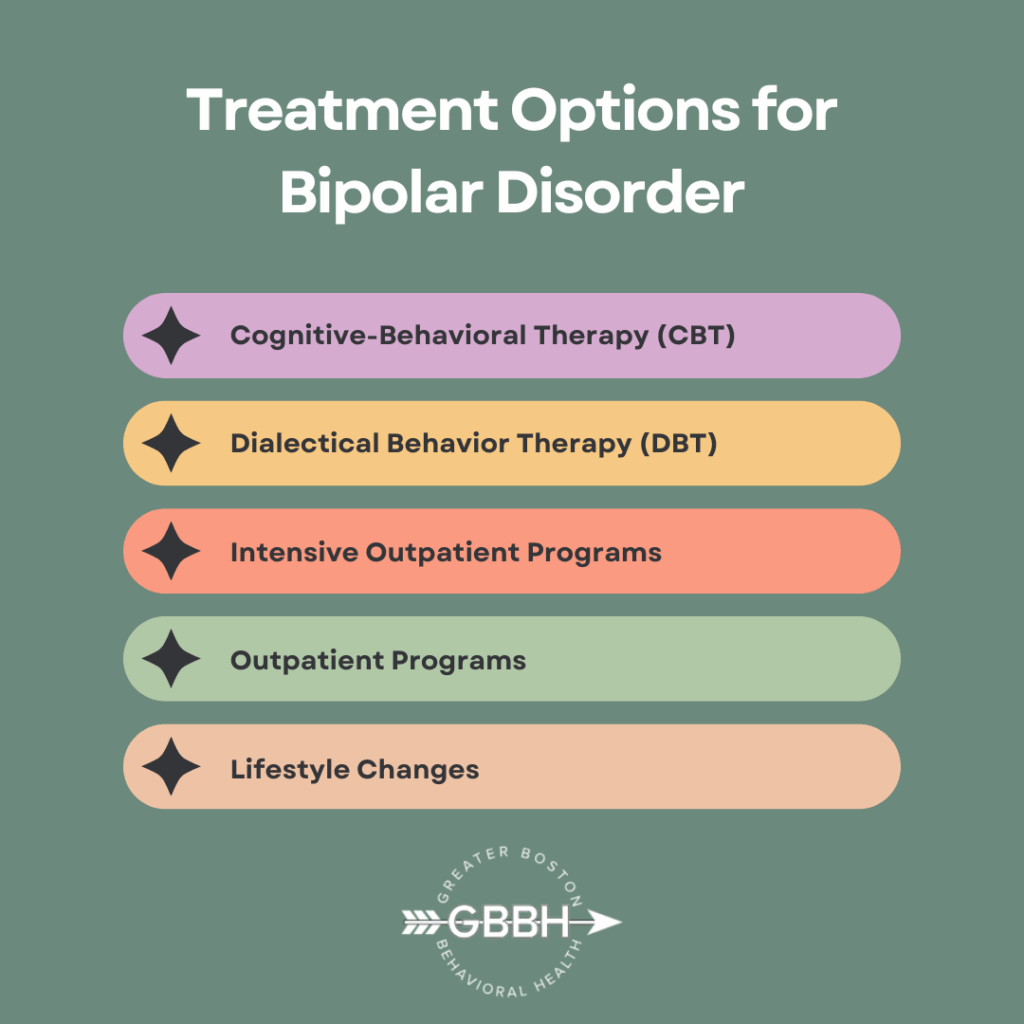Bipolar disorder is a mental health condition characterized by extreme mood swings that include emotional highs (mania or hypomania) and lows (depression). These mood shifts can be disruptive and significantly affect an individual’s quality of life. Fortunately, there are a variety of treatment options available, from medications to therapy, that can help manage bipolar disorder symptoms and improve overall well-being.
Managing this disorder requires a comprehensive approach that often includes a combination of medication, therapy, and lifestyle adjustments. Today we will take you through several treatment options like bipolar disorders like medication, specialized programs like intensive outpatient programs, mental health therapy programs, outpatient care treatment, etc.
What Is Bipolar Disorder?
Bipolar disorder affects approximately 2.8% of the U.S. adult population and often begins during adolescence or early adulthood. It is a chronic condition that typically requires lifelong treatment to manage. People with bipolar disorder experience alternating periods of mania or hypomania and depression, which can last for days, weeks, or even months. These mood swings can lead to challenges in personal relationships, work, and daily functioning.
Types of Bipolar Disorder
There are several types of bipolar disorder:
- Bipolar I Disorder: Characterized by severe manic episodes that last at least seven days or by manic symptoms severe enough to require hospitalization. Depressive episodes typically occur as well, lasting at least two weeks.
- Bipolar II Disorder: Involves a pattern of depressive episodes and hypomanic episodes, but not the full-blown manic episodes typical of Bipolar I Disorder.
- Cyclothymic Disorder: Periods of hypomanic symptoms and periods of depressive symptoms lasting for at least two years (one year in children and adolescents), but the symptoms do not meet the diagnostic requirements for a hypomanic episode or a depressive episode.
- Other Specified and Unspecified Bipolar and Related Disorders: Bipolar symptoms that do not fit into the above categories.
How Does Medication Help In MDP?
Medication helps stabilize mood swings, reduce the frequency of episodes, and prevent the condition from worsening. Several types of medications are commonly prescribed, including mood stabilizers, antipsychotics, and antidepressants.
- Mood Stabilizers: Lithium, one of the most well-known mood stabilizers, is often used to prevent manic and depressive episodes. These medications work by balancing the neurotransmitters in the brain, helping to reduce the intensity of mood swings.
- Antipsychotics: For those experiencing severe manic episodes or when mood stabilizers alone aren’t effective, antipsychotic medications such as olanzapine, quetiapine, or risperidone may be used. These medications help manage symptoms of mania and can also be useful in treating bipolar depression.
- Antidepressants: While antidepressants can be effective in treating the depressive episodes of bipolar disorder, they are typically prescribed with caution. When used alone, they can sometimes trigger manic episodes, which is why they are often paired with mood stabilizers.
Cognitive-Behavioral Therapy (CBT)
- How CBT Works: Cognitive-Behavioral Therapy involves working with a mental health professional to develop coping strategies that help manage symptoms. It focuses on changing the automatic negative thoughts that can worsen mood swings and provides practical tools for dealing with stressful situations.
- Benefits of CBT: It also helps individuals gain better control over their emotions, making it easier to manage the ups and downs of the disorder.
Dialectical Behavior Therapy (DBT)
Dialectical behavior therapy (DBT) is another therapeutic option that has proven effective for individuals with bipolar disorder, particularly those who struggle with intense emotions or self-harm behaviors.
- What is DBT?: This combines cognitive-behavioral techniques with mindfulness practices, helping individuals accept and regulate their emotions while also working on interpersonal effectiveness.
- DBT Skills Training: DBT teaches skills in four key areas: mindfulness, distress tolerance, emotional regulation, and interpersonal effectiveness. These skills help individuals manage their mood swings more effectively, reducing the risk of self-destructive behaviors.
Intensive Outpatient Programs (IOP)
- What is an IOP?: They provide a higher level of care than standard outpatient programs, making them suitable for those who need intensive support without the need for hospitalization.
- Benefits of IOP: IOPs allow individuals to receive comprehensive care while still living at home, maintaining work or school commitments. This balance can be crucial for those managing bipolar disorder, as it provides consistent support and monitoring while promoting independence.
Outpatient Programs
- How Outpatient Programs Work: In an outpatient setting, individuals attend therapy sessions at a Mental Health Treatment Center in Massachusetts, where they continue working on the skills needed to manage their disorder. These sessions can include individual therapy, group therapy, and family therapy.
- Flexibility and Support: Outpatient Programs offer flexibility, allowing individuals to receive treatment while maintaining their daily responsibilities. This ongoing support is crucial for managing the chronic nature of bipolar disorder and preventing relapse.
Lifestyle Changes
Bipolar disorder is often managed more effectively when paired with lifestyle changes. Certain practices can help individuals with bipolar disorder maintain stability, including:
- Regular Sleep Schedule: Maintaining a regular sleep routine is critical in preventing both manic and depressive episodes. Irregular sleep patterns can trigger mood swings.
- Healthy Diet and Exercise: A balanced diet and regular exercise have been shown to improve mood and overall mental health. Exercise can act as a natural mood stabilizer.
- Stress Management: Learning how to manage stress through mindfulness, yoga, or relaxation techniques can help prevent mood episodes from becoming overwhelming.
- Avoiding Alcohol and Drugs: Substance use can interfere with the effectiveness of medication and may exacerbate symptoms of bipolar disorder. Avoiding alcohol and recreational drugs is essential in maintaining stability.
Mental Health Programs in Massachusetts
Massachusetts is home to numerous specialized mental health treatment programs that offer a range of services for individuals with bipolar disorder. These programs provide a supportive environment where individuals can access medication management, therapy, and holistic care.
Conclusion
Whether through medication, Cognitive-behavioral therapy, Dialectical behavior therapy, or specialized programs like intensive outpatient programs and Outpatient programs, there are numerous options available to help manage this disorder. If you or a loved one is struggling with bipolar disorder, consider reaching out to a mental health treatment center in Massachusetts to explore the best treatment options available or Call us today at (888)278-0716 to begin healing today. Remember, effective management of bipolar disorder requires a comprehensive and individualized approach, so don’t hesitate to seek the support you need.
FAQ on Bipolar Disorder Treatment Options
What are the most common medications used to treat bipolar disorder?
The most common medications include mood stabilizers (such as lithium), antipsychotics (like olanzapine and quetiapine), and sometimes antidepressants to manage the depressive episodes, though they are often used cautiously to avoid triggering manic episodes.
How does Cognitive Behavioral Therapy (CBT) help in managing bipolar disorder?
CBT helps individuals manage bipolar disorder by changing negative thought patterns and providing coping strategies to handle stress, mood swings, and challenges. It’s effective in reducing the severity of both manic and depressive episodes.
What is the difference between Bipolar I and Bipolar II disorders?
Bipolar I disorder involves severe manic episodes, often requiring hospitalization, along with depressive episodes. Bipolar II involves less intense hypomanic episodes but is paired with significant depressive episodes.
How effective are Intensive Outpatient Programs (IOPs) for bipolar disorder treatment?
IOPs offer structured treatment without requiring hospitalization. They provide intensive support through therapy, medication management, and skills training, allowing individuals to continue daily activities while receiving comprehensive care.
What role do lifestyle changes play in managing bipolar disorder?
Lifestyle changes such as maintaining a regular sleep schedule, healthy diet, regular exercise, and stress management are essential in preventing mood episodes and complementing the effects of medication and therapy. Avoiding substances like alcohol and drugs also supports stability.


